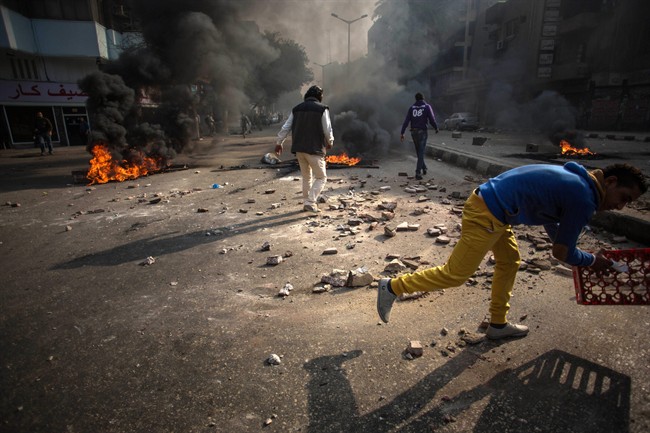CAIRO – A court sentenced two policemen on Monday to 10 years in prison for the 2010 brutal beating death of a young Egyptian that became a rallying cry for the protesters who overthrew longtime autocrat Hosni Mubarak.

Rights groups however said the years-long wait before anyone was held accountable for the killing of 28-year-old small businessman Khaled Said in the port city of Alexandria highlights that the wider problem of police abuse, a major grievance of the 2011 protesters, remains unresolved.
Photographs of the dead Said’s face, disfigured by what appeared to be a brutal beating, were posted on the Internet and became a rallying cry against torture and other police brutality under Mubarak. Activists used a Facebook page set up in Said’s memory to call for the protests that ultimately forced Mubarak from power in February 2011.
Authorities long denied that Said was killed, with successive forensic reports and official statements claiming he had choked on a packet of drugs he swallowed to hide it from the approaching policemen.
The two low-ranking policemen — Awad Suliman and Mahmoud Salah — had previously been convicted and handed sentences of seven years but that conviction was later overturned and a new trial was ordered.
Said’s sister Zahraa said her brother was finally vindicated after the Alexandria court confirmed he died under torture and not from suffocation from swallowing drugs. She said she would sue officials who accused her brother of being a drug addict.
“They had defamed his image,” she told The Associated Press. “This is the beginning. We still have to get moral retribution. Then I can tell him to rest in peace.”
The verdict may still be appealed.
Lawyer Mohammed Zarie said the verdict was only possible after the fall of Mubarak’s regime, adding that the long-delayed verdict in Said’s case reveals the faults in a system that protects officials and prevents them from being held accountable.
“Torture has protection,” said Zarie, who runs an organization that looks into torture cases. “State institutions have repeatedly resisted investigation into this case … Regrettably, we can only have retribution for the victims only after the regime is changed.”
Calls to Interior Ministry officials were unreturned. But officials from the ministry had before dismissed claims of continued torture, saying that the police have been reformed since the 2011 uprising.
The ministry said in a statement last month that it was ready to receive and investigate complaints and act against culprits. “This is in light of the change in the work culture in the police force and the insistence on committing to human rights and respecting of human dignity,” the statement said.
Egypt has seen two presidents overthrown since Said’s death: Mubarak, and an Islamist who won 2012 elections, Mohammed Morsi.
Zarie said authorities have become more ready to issue monetary compensations to victims in cases of torture. He said he himself has won more than 100 compensations for torture victims in the past years, but never was able to prosecute an official.
Legal proceedings against police accused of killing hundreds of demonstrators in the 2011 uprising have largely stalled, with most of those prosecuted acquitted and few new cases filed.
Meanwhile, rights groups say the security forces continue to use deadly force against protesters and detainees are still frequently tortured in custody.
Since Morsi was overthrown by the army following mass protests against him, the military-backed government has cracked down on his group the Muslim Brotherhood and other Islamists. Rights groups estimate that well over 2,000 have died in political violence since then.
Security agencies say a tight grip is necessary to restore stability, particularly with a surge in attacks by militant groups, mostly targeting police, following the army’s removal of Morsi.
On Monday, two low-ranking policemen were shot and killed in two separate incidents. A statement by the Interior Ministry said one was gunned down on the way to work in the southern province of Beni Suef. A security official said another was shot dead and two others wounded by gunmen on a motorcycle who opened fire on their vehicle on a rural highway in Giza province, near Cairo.
The official spoke on condition of anonymity because he was not authorized to brief reporters.



Comments